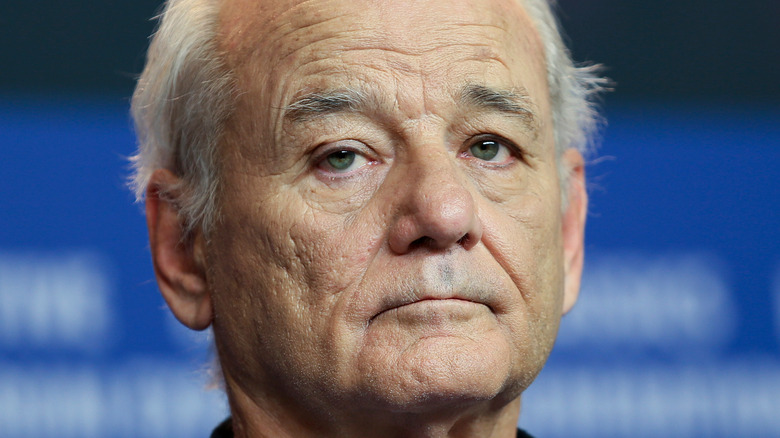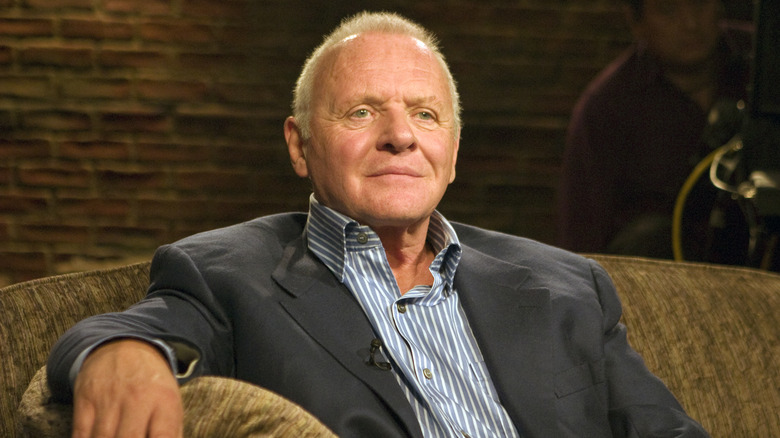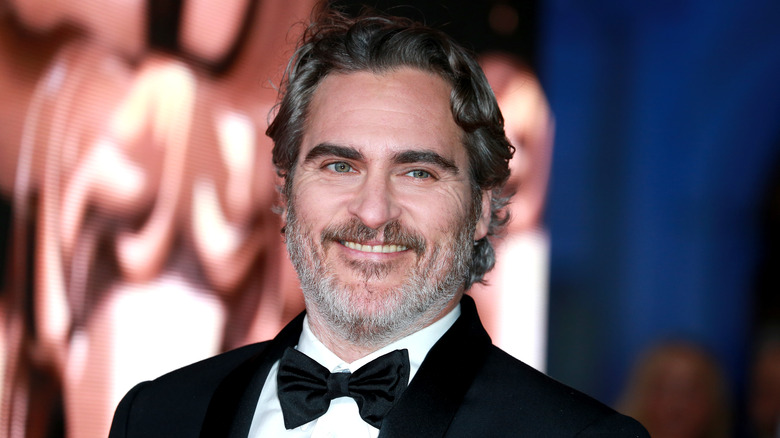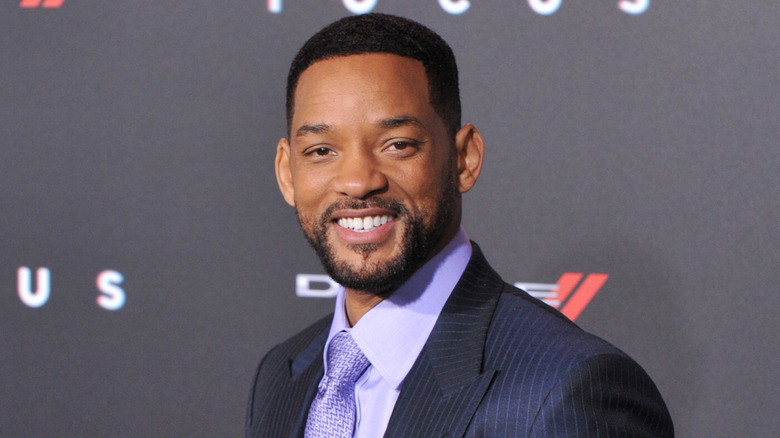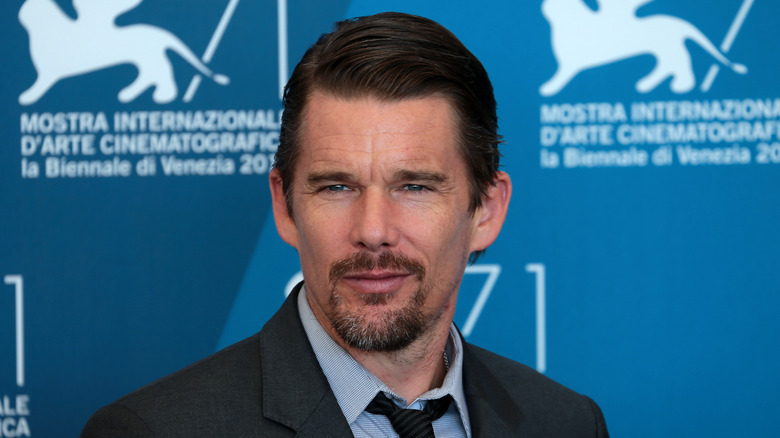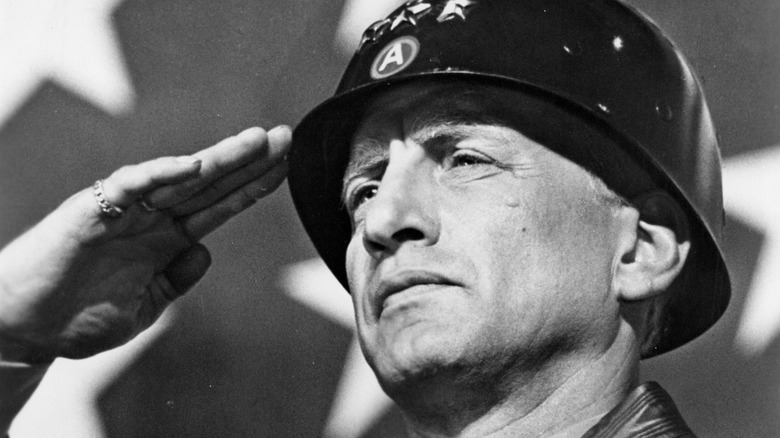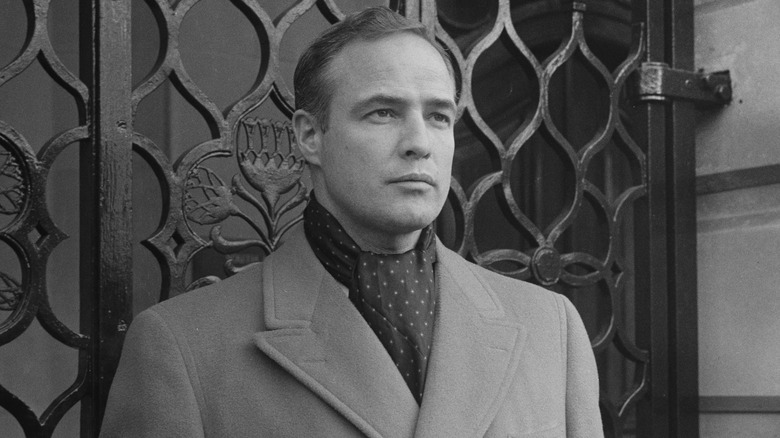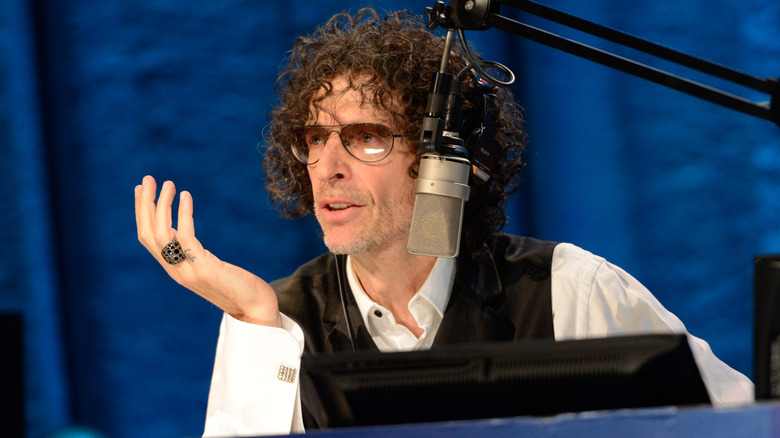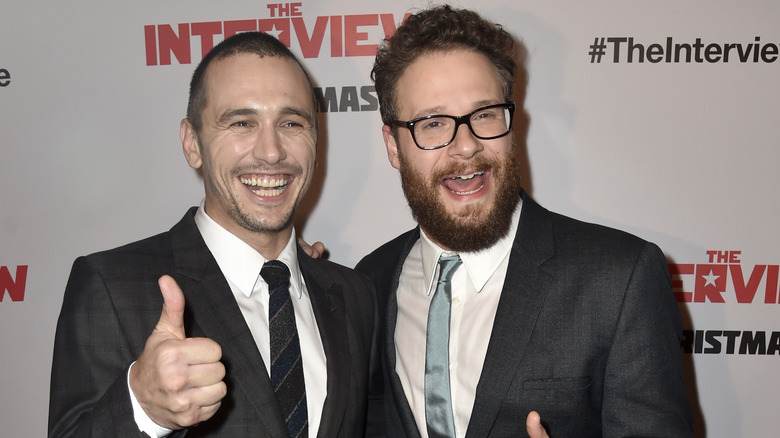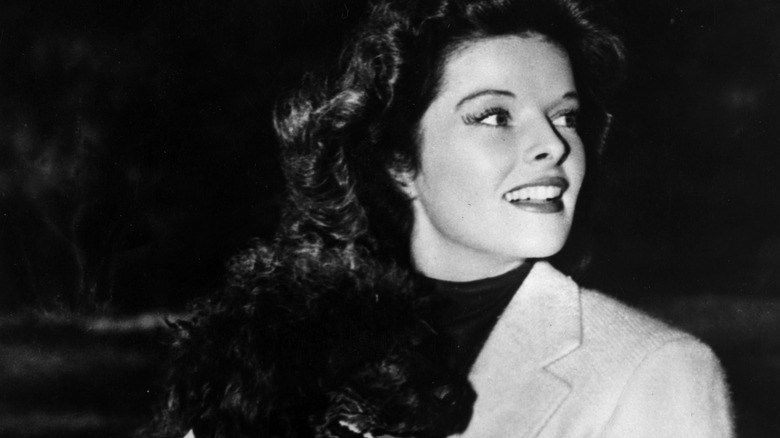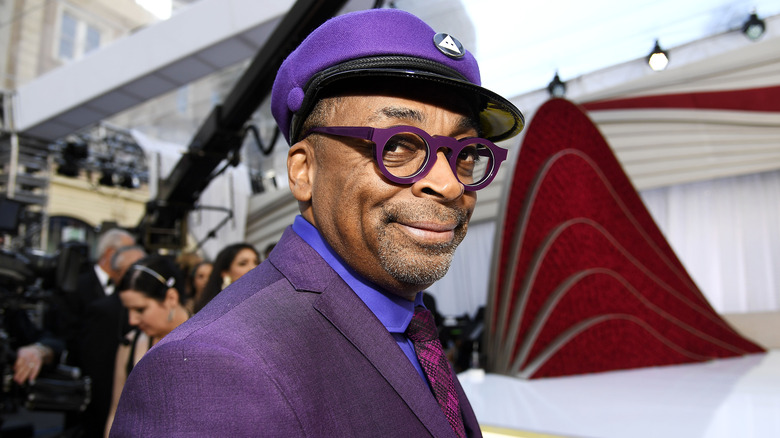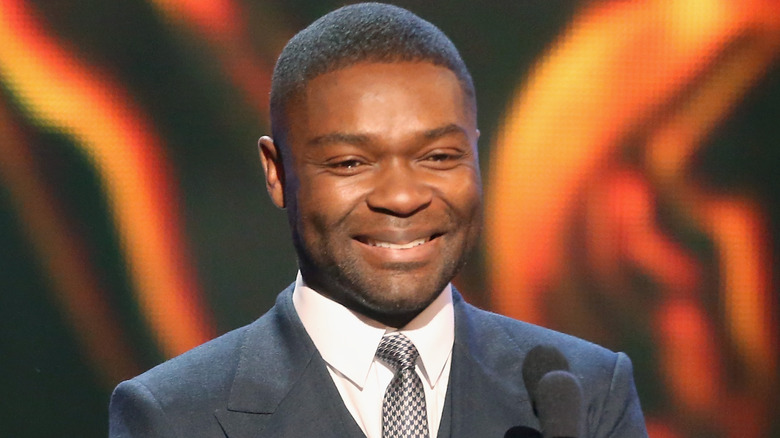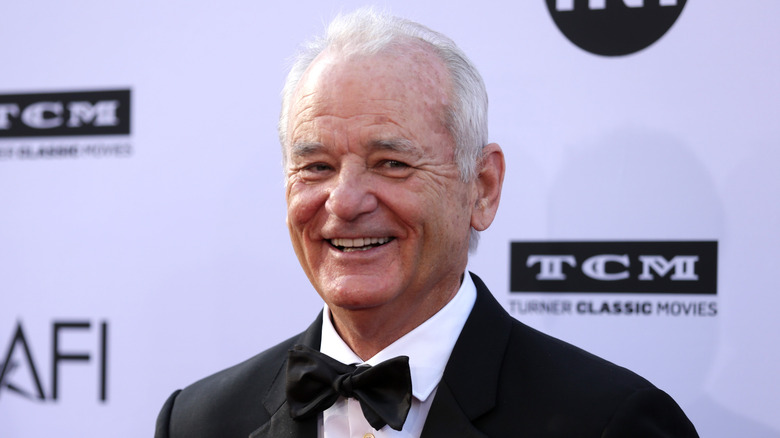Stars Who Trashed The Oscars
The following article includes mentions of sexual assault allegations.
For some people, the Oscars represent Hollywood at its best: incredible performances, beautiful outfits, and tear-jerking acceptance speeches. But despite all their glamour, there are some actors who can't stand the awards.
For example, John Gielgud was one of the rare actors to ever achieve an Emmy, a Grammy, an Oscar, and a Tony during his lifetime. But the classically trained thespian was notoriously unimpressed with major awards shows, despite his remarkable success. When he won best supporting actor at the Academy Awards in 1982 for his role as Hobson the valet in "Arthur," Gielgud didn't attend the ceremony. In his letters, which were published in 2004, the British actor admitted that he was "pleased" with the win but added that "wild horses" couldn't drag him to collect the award. "I really detest all the mutual congratulation baloney and the invidious comparisons which they evoke," he observed.
And many actors still feel the same way as Gielgud nowadays. The Oscars have come under fire for numerous reasons, including their failure to include more foreign or independent films, the lack of diversity among the nominees, and their endless press cycles, even from the winners themselves. Keep reading to find out which stars have let the Academy know how they really feel.
Anthony Hopkins
Although Anthony Hopkins has received his share of awards over the years, the Welsh actor is not impressed by accolades and publicity. "I can't stand all that," he told HuffPost in 2012, calling the press around awards season "nauseating to watch" and "disgusting to behold." He had been receiving positive reviews for his performance as Alfred Hitchcock at the time, but Hopkins frankly admitted that he had no intention of trying to win another Oscar.
"In a way, I'm sort of relieved that I don't have to get embroiled in all this publicity face to face," he revealed, insisting that the process was pointless. "You know, I've been around — I've got the Oscar myself for 'Silence of the Lambs' — and having to be nice to people and to be charming and flirting with them ... oh, come on!" Hopkins also revealed that other actors "go out of their way to flatter the nominating body," a spectacle which he deemed "kind of disgusting" and "against my nature."
Hopkins would later go on to win another Academy Award for best actor in 2021, becoming the oldest ever winner at the age of 83. He still didn't see eye-to-eye with the Academy, however, as "The Father" star didn't come to the ceremony in person and wasn't allowed to accept the award over Zoom, according to The New York Times.
Joaquin Phoenix
Joaquin Phoenix has never been afraid to express his views. And the actor didn't hold back in 2012 when he spoke to Interview magazine about the experience of campaigning for an Oscar and how much he regretted taking part in the publicity circus.
"It was one of the most uncomfortable periods of my life," he admitted, reflecting on his time in the spotlight after starring in the Johnny Cash biopic "Walk the Line," which received multiple nominations in 2006. "I never want to have that experience again. I don't know how to explain it — and it's not like I'm in this place where I think I'm just above it — but I just don't ever want to get comfortable with that part of things." He also called the awards circuit the "stupidest thing in the whole world." Although his latest film at the time, "The Master," was receiving Oscar buzz, Phoenix argued that the whole process was "totally subjective" in how it measured acting ability. "I think it's total, utter bulls**t, and I don't want to be a part of it. I don't believe in it," he stated. "It's a carrot, but it's the worst-tasting carrot I've ever tasted in my whole life. I don't want this carrot."
The reclusive star later went back on his comments, according to Vulture, acknowledging that the Oscars had helped his career and clarifying that he didn't "hate" them. But Phoenix still had something to get off his chest in 2020, per Indiewire, when the celebrated "Joker" actor criticized awards ceremonies for excluding people of color.
Will Smith
Will Smith is one of the most beloved actors in Hollywood, but he faced backlash in 2016 over his controversial choice to boycott the Oscars over a lack of diversity. Out of 20 actors nominated for their performances that year, all 20 were white. After years of the same old line-up, Smith felt the need to make a stand against what he called a "regressive slide toward separatism, towards racial and religious disharmony."
"That's not the Hollywood that I want to leave behind," he told "Good Morning America" (via Variety). "It feels like it's going in the wrong direction." Smith clarified that all the nominated actors were "fantastic," but he felt like he still had to draw attention to the larger issue. "There's a position that we hold in this community and if we're not a part of the solution, we're part of the problem," the star argued, explaining why he felt the need to "protect and fight for the ideals that make our country and our Hollywood community great."
He also denied that the #OscarsSoWhite protest had anything to do with his personal resentment over not being nominated for the film "Concussion" that year. "This is so deeply not about me," Smith insisted. "This is about children that are going to sit down and watch this show and they're not going to see themselves represented." His wife, Jada Pinkett Smith, had already announced her boycott of the Oscars on Facebook, telling her fans that she had to "stand in [her] power."
Ethan Hawke
Ethan Hawke could be called an Oscars favorite, since he's been nominated four times over his career, as of this writing. But the actor had some thoughts about the quality of films selected by the Academy, as he told Gotham (via Page Six) in 2013.
"People want to turn everything in this country into a competition," Hawke commented, calling the whole process "so asinine." The actor also criticized the film industry's focus on box office draws. "If you look at how many forgettable, stupid movies have won Oscars and how many mediocre performers have Oscars above their fireplace. Making a priority of chasing these fake carrots and money and dubious accolades, I think it's really destructive," Hawke observed. The "Training Day" star later clarified his comments to The Hollywood Reporter, acknowledging that the Oscars "do a very good job in representing much of the great work in a given year" and encouraging the "genuine and deserved excitement that every nominee should feel." Hawke still felt that a lot of smaller films missed out on getting recognition, however, because their budget couldn't compare to "the mass marketing and PR machines that march through the awards season."
Two years later, he didn't mince his words about not winning the best supporting actor category for his role in "Boyhood" at the 2015 Oscars. "So much mediocrity is strung up the flagpole. I'd rather not win," he told the Evening Standard, declaring that he had "made [his] peace" with the ceremony.
George C. Scott
George C. Scott made history in 1971 when he became the first actor to turn down an Academy Award for his performance in "Patton." In a telegram sent before the ceremony, according to Time magazine, he "respectfully requested" that they removed him from the list of best actor candidates. "My request is in no way intended to denigrate my colleagues," Scott clarified, adding, "Furthermore, peculiar as it may seem, I mean no offense to the Academy. I simply do not wish to be involved."
Although he ended up winning the trophy, Scott didn't attend the ceremony. And the actor — who'd previously made history in 1962 for refusing a nomination for "The Hustler" — was less diplomatic about the Oscars when speaking to the press, as the Los Angeles Times reported. "The ceremonies are a two-hour meat parade, a public display with contrived suspense for economic reasons," Scott declared, calling it "offensive, barbarous and innately corrupt." His disdain for Hollywood was an open secret, as he told The New York Times in 1970: "I make movies largely for the money and always have. It's a tedious, deadly, boring way to make a living."
"I just never wanted to be involved in that part of the business," he later reflected in an interview. Scott added that awards shows were "just not my bag" and that he found them "a detriment" to his acting. However, as he admitted with a laugh, "Many people don't agree with me."
Marlon Brando
Marlon Brando created a moment in Oscars history in 1973 when he won the best actor award for playing Vito Corleone in "The Godfather." The method actor refused to attend and had activist Sacheen Littlefeather turn down the award on his behalf, so that she could deliver a speech about Hollywood's treatment of Native Americans. Although the ceremony organizers stopped her from delivering the whole address, Littlefeather was able to draw attention to ongoing clashes at Wounded Knee and expressed hope that "in the future, our hearts and our understandings will meet with love and generosity."
"It was not a performance, it was a real presentation," Littlefeather later told The Guardian. "I think that's what took people by surprise: that it was so real. It really touches people's hearts to this day." She also reflected on the hostile reception her speech received: The audience reaction was split between applause and booing, while actors backstage mocked her. John Wayne was apparently particularly furious over her critique of Westerns, as she recalled. "During my presentation, he was coming towards me to forcibly take me off the stage, and he had to be restrained by six security men to prevent him from doing so," Littlefeather noted.
In an interview on "The Dick Cavett Show," Brando later criticized the Oscars for not letting Littlefeather finish her speech. "They didn't want her there," he shrugged. "They didn't want the evening interrupted with that particular note."
Howard Stern
Howard Stern has been open about his lack of respect for the Oscars, which he called "an awards show for lunatics" back in 2011. The radio host was defending friend Brett Ratner's controversial comments and use of anti-LGBTQ+ slurs, according to The Hollywood Reporter, which had led to Ratner losing his job producing that year's Academy Awards ceremony. On his SiriusXM radio show, Stern argued that it had been Ratner's "dream" and that Hollywood was hypocritical for pressuring him to quit over his homophobic language.
"The Oscars are the same place where Charlie Sheen-types can go and get applauded," the radio host pointed out. "This is the same industry, by the way, that wants Roman Polanski to be forgiven for raping a 13-year-old, that it's time he be let back in the United States. I would hang him by his balls." Stern went on to criticize the Oscar-winning actor Hilary Swank, as well, saying, "I know the industry wants to think of themselves as pristine, but I believe they've given two Academy Awards to a woman who just honored the president of Chechnya."
Ratner wasn't invited back to the Oscars and his pick for host, Eddie Murphy, also eventually stepped down, per CNN. The controversial director would also later face sexual assault allegations from multiple women, as People reported in 2017, making Stern's comments look a little ironic in hindsight.
If you or anyone you know has been a victim of sexual assault, help is available. Visit the Rape, Abuse & Incest National Network website or contact RAINN's National Helpline at 1-800-656-HOPE (4673).
James Franco and Seth Rogen
James Franco bore a grudge against the Oscars after his hosting duties in 2011 fell flat. As he explained to Playboy that same year, the actor had told producers that he didn't think the material was any good the week before he was due to appear on stage next to co-host Anne Hathaway. "I don't know why you hired me," he claimed to have told the Oscars team (via the Los Angeles Times). "Because you haven't given me anything."
Franco felt especially "trapped" while dressed up as Marilyn Monroe in her iconic pink dress, as he revealed. "I was so pissed about that, I was deliberately going to fall onstage and hopefully my dress would fall off or something — they couldn't blame that on me," the actor recalled, adding, "I felt, 'This is not my boat. I'm just a passenger, but I'm going down and there's no way out.'"
His longtime friend and collaborator, Seth Rogen, backed him up in a 2011 interview with ShortList, explaining that Franco's experience was enough to put him off hosting the Oscars, too. "I think when you agree to do something like that, you put a certain amount of faith in the institution, hoping that they'll take care of you, and I feel like they didn't," Rogen argued, calling the team "unprepared" and criticizing the monologue they prepared. "I think they hung him out to dry. So I wouldn't do it unless they hired some better writers."
Katharine Hepburn
Although Katharine Hepburn holds the record for winning the most acting category Oscars, she was famously never impressed by the glitz and glamour of the Academy Awards. "As for me, prizes are nothing," she once proclaimed, per The Hollywood Reporter. "My prize is my work."
Over the years, Hepburn racked up an astonishing 12 nominations and four wins, but never collected any of her awards in person. Her first gong came for 1933's "Morning Glory," when she was still a rising star. When Hepburn won again for "Guess Who's Coming to Dinner" in 1968, the award was presented by her co-star, Sidney Poitier, and accepted by the film's director, George Cukor. At the 1969 Oscars, the Academy surprised everybody by announcing a tie between Hepburn and a young star called Barbra Streisand, the latter of whom delivered an acceptance speech sans Hepburn. And in 1982, Jon Voight accepted on Hepburn's behalf for the movie "On Golden Pond," explaining that the star was busy working on Broadway at the time.
Hepburn only appeared at the Oscars ceremony in 1974, when she was asked to present the Irving G. Thalberg award, which singles out "creative producers" with impressive track records. The recipient that year was her friend, Lawrence Weingarten, and Hepburn was greeted with uproarious applause when she appeared on stage to honor him. The actor joked that she was relieved nobody from the audience had shouted, "It's about time," before declaring: "I'm the living proof that a person can wait 41 years to be unselfish."
Spike Lee
Spike Lee made headlines when he temporarily walked out of the Academy Awards after "Green Book" won best picture in 2019. The acclaimed director had finally won his long-overdue first Oscar for the screenplay for "BlacKkKlansman" that year, but it had been beaten out for best picture by a critically divisive film about a Black pianist being driven through the South by a white man.
"I'm snake-bit. I mean, every time somebody's driving somebody, I lose," Lee joked to reporters afterward, referring to the 1990 Oscars, when his critically lauded hit "Do the Right Thing" had been snubbed and "Driving Miss Daisy" had won best picture instead. "But they changed the seating arrangement!" When the press asked him why he left, he quipped, "No, I thought I was courtside at the Garden, the ref made a bad call."
Lee had previously criticized the Oscars over its lack of diversity during the #OscarsSoWhite backlash, vowing that he wouldn't attend the 2016 ceremony on Instagram. The director questioned "how [it was] possible" that only white actors had been nominated two years in a row, revealing that he faced a barrage of calls about diversity in the Oscars every year. He also pointed a finger at executive producers for deciding what projects got a green light in the first place. "This thing's not gonna turn around overnight," Lee later reflected to The New York Times in 2020. "It's been a battle from the beginning: Hattie McDaniel, Sidney Poitier. And why should we think that struggle is not a part of our existence?"
David Oyelowo
One of the most surprising Oscar snubs of 2015 was David Oyelowo, who had received critical acclaim for playing Martin Luther King Jr. in Ava DuVernay's movie "Selma."
In a speech the following year, the British actor revealed that the Academy's president, Cheryl Boone Isaacs, had talked to him "about what went wrong," per The Hollywood Reporter. "The Academy has a problem. It's a problem that needs to be solved," Oyelowo declared. "For 20 opportunities to celebrate actors of color, actresses of color, to be missed last year is one thing; for that to happen again this year is unforgivable." He also called the Oscars "the zenith" of "celebration of artistic endeavor within the filmmaking community," explaining that white actors benefited from that "august establishment."
In 2020, Oyelowo accused Academy voters of deliberately ruining the film's chances because of the cast and crew's activism after the death of Eric Garner while in NYPD custody. "I remember at the premiere of 'Selma' us wearing 'I Can't Breathe' T-shirts in protest," he told ScreenDaily, alleging that members of the Academy had been so angry that they phoned the movie's producers and the studio straight away. "How dare they do that? Why are they stirring s**t?" they reportedly asked, while threatening, "We are not going to vote for that film because we do not think it is their place to be doing that." DuVernay confirmed Oyelowo's version of events on Twitter, simply writing, "True story."
Bill Murray
When Bill Murray was nominated at the 2004 Academy Awards for starring opposite Scarlett Johansson in "Lost In Translation," he thought that he was probably going to win. As the actor later told "CBS This Morning," his performance had been singled out by other film awards, so he had already prepared "some funny things" to say in his acceptance speech.
"I was going to say, 'You know, when I heard I'd been nominated with ... these other people, I thought I really had a pretty good chance,'" the comedy legend joked, deliberately subverting the usual sycophantic speeches. On the actual night, however, the trophy went to Sean Penn for his performance in "Mystic River." Murray sat still and didn't applaud his rival, leaving audiences to wonder whether he was angry.
"I was pissed at myself," he later admitted in an interview with The Guardian. "I don't approve of award ceremonies, so I was wondering what had persuaded me to attend that one." Murray went on to explain his lack of Oscars by arguing that the Academy didn't appreciate comedy. "Even Charlie Chaplin knew it," he commented. "Laughter and the lighter moments of life always seem easy to deliver. I don't expect those giving out the awards to understand."

